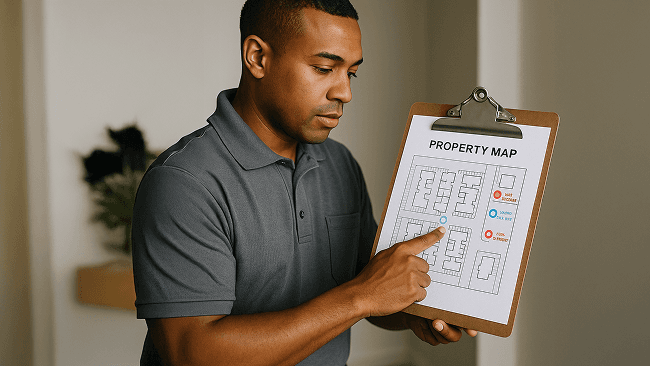Financial Terms for Maintenance Pros
Hi there and welcome. This short video is all about helping you, the maintenance team heroes. Get comfortable with key financial terms. You'll hear in the world of multi-family housing, whether you're turning units, fixing HVAC systems or tackling work orders, your work plays a huge role in how the properties performs financially.
When maintenance teams understand the financial side of things, the entire side runs smoothly. So the first section we're gonna cover there is why financial literacy matters. You might be thinking, I'm not an accountant. Why do I need to know the financial terms? But let me give you a few reasons why this will be very beneficial for.
When you understand the basics of property, income, and expenses, you can make smarter spending decisions, communicate more clearly with managers and vendors, spot cost saving opportunities, and understand how your work impacts the bottom line. You don't have to memorize formulas or balance spreadsheets, but knowing what these financial terms mean can help you and your team succeed.
Let's get started with some terms you'll hear often in our industry and how they connect to your daily work. So the core financial terms that we're gonna go over are these first few operating statement, which is an overview of all property revenues and expenses. The second term on that would be general ledger detailed transaction level data, where you'll see PO charges, vendor payments, ETC, re-forecasting, adjusting budget projections based on actuals. Often this is done in the middle of the year to make sure that we're aligned with our budgets. And then lastly, for this session, annualization estimating a full year's results based on a partial year. What's the relevance of all these? These documents tell the story of how a property is performing and where maintenance dollars go.
So the next section we're gonna cover is income and metrics. This is a very important aspect of property management, income and metrics. The first term we have for that is GPR, which is gross potential rent, which is the total rent if all units were occupied at market rate. The second one that is GPI, which is gross potential income.
GPR. Plus other revenue like parking, pet fees, ETC, that's just, gross potential rent loss gain to lease. The difference between the actual rent and the market rent. So if you're a owner rents department at this rate, what is the actual market rate on that unit? Are we lose, losing or gaining to the lease?
Auxiliary income, non rent, income from amenities, vending, et cetera. So that's gonna be anything extra for the property that we make. Moneywise, it could be vending machines maybe parking passes things like that. Concessions. These are rental discounts or move in specials. And then sometimes we'll give a concession to get apartments leased, and then sometimes we have to get a concession because maybe there's an issue that.
We didn't cover to the best of our ability, or maybe we couldn't for a certain reason. So we'll give that resident a concession to make up for that. So the relevance with these terms is these terms explain how income is measured and why it's important to minimize unnecessary maintenance delays that affect occupancy and.
Collection. The next section we're gonna cover would be expense and cash flow terms. The first one we have on this list is replacement reserve budget set aside for long-term replacements. Normally these are stuff like HVAC, replacements, appliances, roofs, big ticket items. We have in the budget there's replacement reserve that all properties have.
That's where normally this money is pulled from. Bad debt, that's rent that's owed. Debt won't be collected or can't be collected. Sometimes if a resident moves out owing us money, that would be considered bad debt, delinquency, rent that is late, but potentially collectible. So what that means is maybe they're late doing the first, they don't pay it until the 12th.
At that point, you're probably gonna be paying late fees and also possibly legal fees. So that's what is bad debt or delinquency depreciation. That's a loss of the asset value over time. And also sometimes depreciation helps justify replacements. A good example of that is carpet, right? Carpet depreciates.
Typically we go carpet every five year term. By year three, your depreciated value of that carpet replacement. The relevance to this is these tie to how maintenance affects long-term value and budget planning. Next section I want to cover would be performance and market terms. The first term I'd like to cover on this section would be KPI, which is key performance indicators.
These are metrics like work order, completion time, cost per unit turnover time, ETC. So we use it for me, for instance, I use KPI of the 24 hour work order guarantee. I expect our teams to have all the work orders completed within 24 hours. That is a key performance indicator. Next term would be economic occupancy.
That is the rent collected as a percentage of GPR can be low, even if physical occupancy is high, right? So economic occupancy is the rent collected as a percentage of the GPR capitalization rate, which a lot of per people say cap rate measures, property return maintenance influence, net income, and thus value, right?
So a lot of owners look for the cap rate when they're getting ready to sell that property or something like that of that nature. Metropolitan projecting data based on trends, et cetera. Maintenance cost year over year, that is an example of metropolitan. The rebel. The relevance of these terms are, these are often used in performance reviews and re-forecasting or forecasting.
And then lastly, the special circumstances receivership. That is a court appointed management due to financial distress. So if a property's not for funding well or performing well, then a lot of times a judge or something like that will assign a receivership to make sure that property is paying who that needs to be paid and putting the money where it's supposed to go, and pretty much keeping a close eye on it.
Second term that we'd like to cover there is inflation. Rising costs important when pricing parts, contracts and labor. We've all seen inflation in the last few years as typically the cost of goods are increased due to circumstances outside of our control. The relevance of these terms is helps teams understand financial stress signals and then they can plan accordingly.
Like you all know, refrigerant right now, the four 10 A is. Going up, right due to the new A two L requirements. So that's inflation on that. By the end of this year, I'm sure most 14 is gonna be skyrocketing. So that's an example of inflation. So in summary, the importance of financial lit literacy is understanding financial terms isn't just for accountants or managers, it's for everyone who helps run their property, including you.
When you understand how income expenses and performance are measured, you can make smarter spending decisions, communicate better with your team and leaders, and even help protect the property's long-term value. Thank you for joining me today on financial terms for maintenance. Have a
great day.




